Member Profiles

Zaldy Tan, MD, MPH, FACP
Professor of Medicine
Cedars-Sinai
Physician Member
The interdisciplinary nature of geriatrics provides the opportunity for physicians to learn from and collaborate with nurses, social workers, pharmacists, therapists, and gerontologists, thereby broadening our clinical perspectives and enriching our professional experience. I have encountered no other medical specialty with such scope and breadth, or colleagues with such intellectual curiosity and deep humanity. In turn, our patients, many of whom have multiple medical, functional, behavioral, and psychosocial issues, benefit from the comprehensive care that only geriatricians have the expertise to provide. These unique aspects of the practice of geriatrics have sustained my passion, curiosity, and interest in our field for the last 20 years.
Since fellowship, my interest has consistently gravitated towards the brain and memory disorders. To me, the brain is a fascinating organ whose inner functioning remains a mystery to modern medicine. It seems that the more answers we get, the more questions arise. The more discoveries we make, the deeper its mysteries get. For decades we have generally accepted that amyloid plaques are the cause of the progressive neurodegeneration and loss of cognition and function in Alzheimer’s disease. Now that we have a way to effectively clear amyloid from the brain and yet the disease continues to march forward, we accept that there are other processes—inflammation, atherosclerosis, tau, microglia—that are involved. The same can be said about other conditions like frailty and delirium.
The complexity of age-related diseases keeps geriatrics researchers busy and clinicians humble in accepting that there will always be mysteries whose solutions are just beyond our reach. Indeed, ‘to cure sometimes, to relieve often, to comfort always’ still holds true for the treatment of age-related conditions. With my interest in memory, I chose geriatrics over other related specialties like neurology and psychiatry because it is only with the broad scope of geriatric medicine that I can address the entirety of my patient’s challenges. When I see a patient for a memory evaluation, as a geriatrician I can unravel the functional, psychological, and social challenges that often dwarf the challenges from their cognitive deficits. From gait and balance to medications and sleep, being a geriatrician memory specialist provides me with a whole person view of the challenges of my patient that have their root in the brain but extend well beyond it. I consider my patients and caregivers as dyads whose health and outcomes are closely intertwined, making it possible for me to form lasting relationships with my patient’s entire family.
As I reflect on my AGS membership experience thus far, I can’t help but look back at the first meeting I attended in Chicago when I was a research fellow. Besides the inspiring plenary talks, the stimulating research presentations, and the rows upon rows of posters, an indelible memory was the air of friendship and collaborative spirit that pervaded the hallways and the conference center. Everywhere I looked, I saw signs of a community coming together. The small group huddled in a discussion, the one on-one meetings between junior and senior geriatricians, and most of all the tight hugs and huge smiles akin to the meeting of long-lost friends impressed upon me the reason why I need to be part of AGS. All these years of being a member has only reinforced that decision. Thanks to AGS, I have had the privilege of being mentored by some of the geriatrics research greats—Inouye, Lipsitz, Kiel, Reuben—but it’s the geriatrics mentoring greats—Fabiny, Gillick, Mosqueda, and countless others—who had the greatest impact in my career path. By gentle nudging, thoughtful questioning, and intent listening, these geriatrics mentors have helped me discover my interests and explore my true passions. Now I am doing the same for more junior geriatricians, hopeful that I can impart some wisdom and provide guidance in their journey.
Why am I a member of AGS? It’s been my professional home for decades—a constant community beyond the four walls of my current institutional home. It’s where I met my mentors, teachers, mentees, and friends. This is why now—over 20 years later—I continue to look forward to every AGS meeting with a similar degree of curiosity and excitement of the new things I will learn, the novel ideas I will hear, and the friends—new and old—that I will have the opportunity to meet.
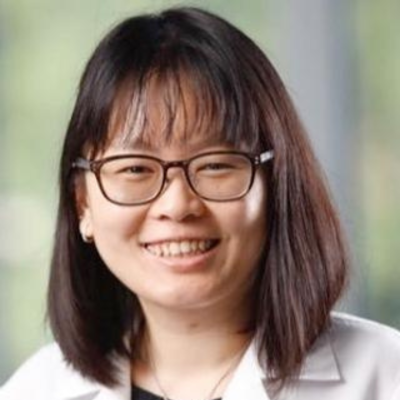
Kah Poh Loh, B.Med.Sci., M.B.B.Ch., B.A.O.
Senior Instructor
Department of Medicine, Hematology/Oncology (SMD)
Physician Member
I’ve been a member of the American Geriatrics Society since my first year of residency, so it’s been nearly a decade now. I joined as a trainee member because I knew I had an interest in geriatrics and became a full member in 2019—and I’ve enjoyed wonderful career-boosting benefits ever since.
As just one benefit of my AGS membership, I’ve met and worked with a diverse group of geriatric professionals from many different institutions. When I first got involved, I was responsible for the Residents’ Sessions. Through that experience, I got to know a lot of trainees who were strictly on the geriatrics track. During my eight years there, I was able to work with and build collaborations with other geriatrics trainees, and now I’m the Vice-Chair of the Cancer and Aging Special Interest Group. That role allows me to foster collaborations among healthcare professionals who are interested in cancer and aging.
When asked which came first, my interest in oncology or my interest in geriatrics, I’d have to answer that I’ve been interested in oncology since medical school, when I became involved in cancer research. From there, I developed an interest in the clinical side, and found that seeing patients with cancer really taught me a lot—the advances in research and clinical practice makes the specialty really interesting and challenging.
It wasn’t until my residency that I became aware of geriatrics—I hadn’t realized that geriatric oncology existed. The field was new, and had only really begun in the early-to-mid 2000’s. My residency program at that point was at Bay State where I got to work with Dr. Maura Brennen. She’s very active in AGS and she really nurtures residents’ interest in geriatrics. Truth be told, when I did a geriatrics rotation during my intern year, I wasn’t sure that it was for me at first, because of the challenges that older patients and their often-complex medical problems can present.
But by the end of that rotation, I found that I’d learned a lot of medicine—and the experience taught me a great deal in terms of approaching patients who have 10 or 15 other medical problems. I came to see that working with older patients was both challenging and rewarding, but I had a hard time figuring out how to combine geriatrics and oncology. And then I learned that Boston University had a combined geriatrics and oncology fellowship that was perfect for me. I ended up applying for it, and now I specialize in taking care of older adults with cancer, specifically those with blood cancer.
Recently, I was delighted to receive the Arti Hurria Award for Emerging Investigations in Internal Medicine Focused on the Care of Older Adults, awarded by AGS and the AGS Health in Aging Foundation.
I was especially honored to receive this award, because Dr. Hurria is a close friend of my mentor, the geriatric oncologist Dr. Supriya Mohile. I got to interact with Dr. Hurria quite a bit since meeting her in my third year of residency. I think of her as kind and a fierce advocate for older adults — she has an amazing ability to unite people around her vision. She was a devoted mentor with a passion for raising up the next generation of geriatric oncologists. This has affected me deeply, and I strive to continue her work and live up to the example she set. So, getting this award really means a lot to me, and I hope I can inspire people that taking care of older adults with cancer is important and rewarding work.
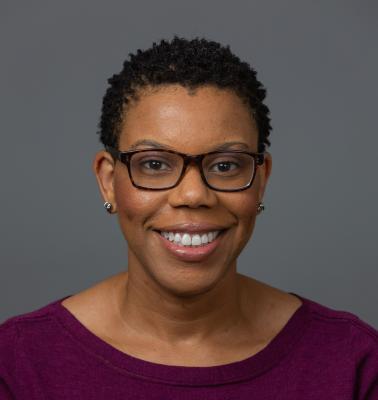
Rasheeda Hall, MD
Assistant Professor of Medicine
Duke University School of Medicine
Physician Member
My inspiration to become a geriatric nephrologist came to me during my nephrology fellowship. I’d encountered some difficult clinical scenarios that centered around older adults on dialysis who had repeatedly been admitted from nursing homes, and whose families wrestled with the complicated decision to start dialysis.
It wasn’t until I was exposed to the idea of geriatric nephrology during my fellowship curriculum that I realized there was a way to specifically care for older adults who had kidney disease, and that there were abundant research opportunities that focused on the field. Since then, I have been very interested in the care of older adults, their mobility and cognitive impairment, and about learning the principles of geriatric medicine.
Although I didn’t complete a geriatrics clinical fellowship, I had deep exposure to geriatrics through my advanced fellowship in geriatrics administered through the VHA.
I’ve been an AGS member since 2017—it took my first trip to an AGS Annual Meeting to convince me that the resources and community AGS offers is a great fit for me and my career goals. I enjoy meeting and networking with the community of healthcare professionals whose drive for improving care for older adults is similar to mine. That’s particularly inspiring for someone like me who’s bridging geriatrics to nephrology. Professionally, my membership means I’m presented with opportunities for career development, mentoring, and collaborations through AGS.
As a very special benefit of my AGS membership, I recently was honored by winning the Arti Hurria Memorial Award! This really means a lot to me. I know how bright Dr. Hurria’s star shined, and I can only strive to have my research have as huge an impact as hers did.
A normal day in my life looks like at least a couple of hours writing for a manuscript or a grant. The rest of my day may be interpreting research findings, attending research meetings, or seeing patients in my clinic. I have been grateful for my geriatric nephrology clinic at the Durham VA healthcare system because it allows me to incorporate geriatric principles into caring for older people with chronic kidney disease. It fuels my research.
I find it very rewarding to be in a position to view clinical care from both perspectives, geriatrics and nephrology, and to give that unique lens to my patients.
My time away from work is primarily spent with my family. Things are really challenging in the world today on top of building a research program, so some things that keep me steady are practicing mindfulness and journaling every day.
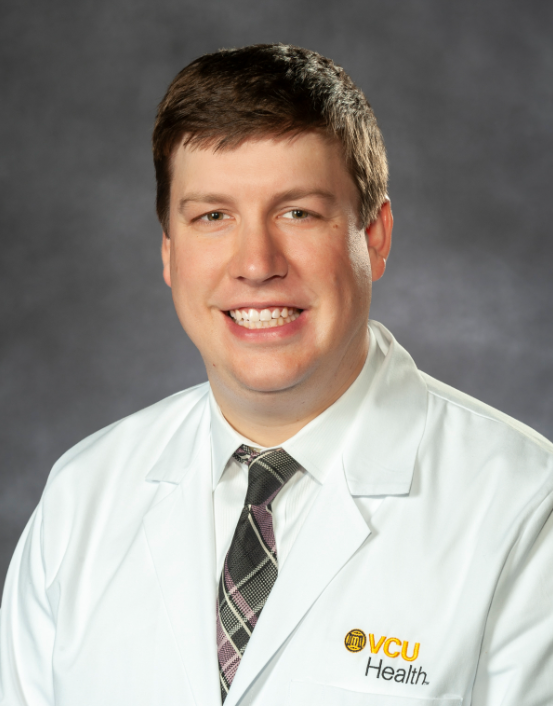
Christian Bergman, M.D., CMD, FACP
Assistant Professor, Division of Geriatric Medicine
Virginia Commonwealth University
Physician Member
When I applied to medical school, one of my first tasks was to write a personal statement. Mine, like many others, was a version of “I want to help people.” I soon discovered that helping people is the most meaningful part of my work. Geriatrics offers the opportunity to enjoy deep relationships with older adults. In geriatrics, we don’t just ask about someone’s symptoms, we dig a little deeper—asking folks about hobbies, families, what sports teams they like. We develop a complete picture of the person in our care. Because so many older adults live with multiple chronic conditions, few randomized controlled research trials exist to guide our treatment strategies. That makes certain aspects of geriatrics care that much more important. We’re often asking a person what their goals of care are and what “quality of life” really means to them.
Creating personalized care becomes a reality in geriatric medicine. And that’s why my AGS membership is so valuable. The networking that members enjoy allows us to connect with experts in many fields and discuss our practices. We connect in person at the Annual Scientific Meeting, online through outlets like MyAGSOnline, and in print through our info-packed quarterly newsletter. Another key way AGS membership has enhanced my practice is through its generous support. I get a free AGS e-membership as a resident, I’ve enjoyed travel stipends for my last two trips to the Annual Scientific Meeting, and I received reduced rates for meeting registration—essential support for an emerging geriatrician.
The Annual Scientific Meeting allows people early in their careers to have eye-opening experiences, meeting some of the leading experts in our field. At the 2015 meeting, for example, I presented a paper on gun violence, and the case triggered a fascinating dialogue about a hot and often ignored topic for our country and older adults. It was a tremendous opportunity to shed light on a topic that we don’t often get to talk about! More broadly, I’ve also volunteered as chair of the Resident Interest Group for AGS. Our goal is to help design events for the Annual Scientific Meeting geared specifically toward residents. We’re planning to promote networking opportunities for fellows and residents during the Annual Scientific Meeting, and to connect resident and student chapters across the country.
Beyond my residency and my work with AGS, the home life I share with my wife, Rebecca, is incredibly fulfilling. We have two sons—Zach was born last August and Eric is three. It’s a roller coaster, balancing home and career, and I’ve had discussions with my peers about navigating residency while raising a family. My system: I block out family time when I come home. We enjoy dinner together and have our bedtime routines with the kids. As a family, we go the beach, the zoo, and the children’s museum—things we can all enjoy. And, I just finished the Game of Thrones series. No spoilers!
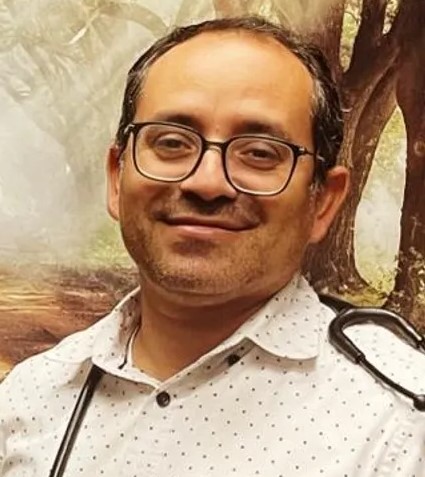
Arbis Rojas, MD
Geriatric Medicine Physician
Private Practice
Physician Member
My grandmother’s battle with progressive dementia made an enormous impression on me as a teenager. I saw first-hand how the disease and its behavioral disturbances affected her and my family as we coped with the inadequacies facing older adults in our health care system. The unhelpful doctor visits and unnecessary trips to the emergency department were particularly difficult for all of us. The awareness I developed during this experience triggered my interest in a career as a geriatrician. I see geriatrics as a personalized form of medicine, and I appreciate the way trainees are exposed to many different medical specialties, including neurology, psychiatry, and physical medicine and rehabilitation.
I joined the AGS when I began my private practice in 2016. As a board certified geriatrician, I have found that my membership helps me stay abreast of the latest advancements in our field. For example, AGS helps members learn the intricacies of CPT-coding (Current Procedural Terminology) and helps prepare them for chronic care management, annual wellness visits, and advance care planning. There has to be continual change in how geriatricians in private clinics practice medicine. Value-based medicine is the future. Where is the value in geriatric medicine? AGS is essential to us all for maintaining the focus on the value of caring for older adults. The AGS mission aligns with my professional mission: to meet the health needs of our older adult population and to focus on their independence and quality of life. I hope to contribute more to this great cause in the future as a leader, sponsor, and partner. The benefits of my AGS membership are many: attending the annual scientific conferences, exchanging ideas on the AGS website forum, and contributing as much as I can to improving the health and wellness of older adults. AGS has certainly contributed to my personal and professional growth and for this I am forever grateful.
One major benefit of my AGS membership is attending the annual meetings. I particularly enjoy meeting new colleagues and exchanging ideas. The lectures are excellent because they present various specialty fields I might not otherwise be exposed to. I take that information and create my own subspecialty clinics to assist homebound patients who cannot physically see specialists but who benefit immensely from new clinical approaches. I am working on improving the operations of the clinic from a chronic care management standpoint. I am working on a mobile and cloud application that is doctor-friendly to help better manage offices. This calls on my understanding of chronic care management in our older-adult population. Finally, I believe that the culture of how medicine is practiced has had many challenges. The cloud-based application I’m working on will hopefully mitigate many of these challenges in our office. Chronic care management is instrumental in my clinic but requires months of work in training staff and understanding systems/standard operation procedures. I believe that staff education in our outpatient offices is key to allowing our physicians to focus on patient care. Work/family balance is essential to me. I am blessed to have a wonderful wife and two great kids, Camila, 5, and Diego, 8. I enjoy my time off by exploring the world with my family and taking part in outdoor activities. I’m actually writing this from Europe, where we’re visiting places like Anncecy, France and Gruyere, Switzerland.
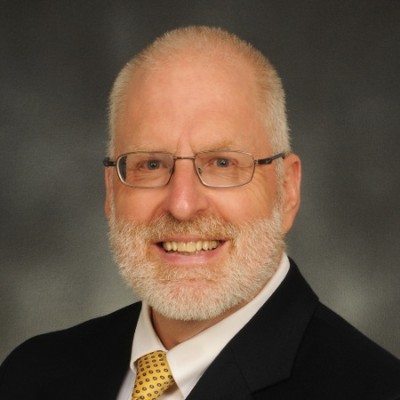
David Elliott, PharmD, FASCP, AGSF, BCGP
Professor of Clinical Pharmacy
West Virginia University
Pharmacy Member
It wasn’t until I was an adult that I discovered the people I really enjoyed interacting with the most were older adults and that the area I found most intellectually challenging was the chronic conditions that older adults are often faced with. Through conversations with colleagues and others who work in geriatrics, I found that many people who decided to go into geriatrics have a long history of exposure to older adults or have been impacted by older adults in some special way. But that really wasn’t the case for me.
In the 1970’s, I was an undergraduate, trying to decide what I wanted to do professionally. As a pragmatic young man, I felt drawn to pharmacy because of my interest in the hardcore sciences, biology, and chemistry. It also didn’t hurt that at the time, you were employable as a pharmacist after completing a bachelor’s degree in pharmacy and although I loved school and loved education, I was not sure if I would get tired of it.
During the later stages of my undergraduate years, I realized that I did, in fact, want to pursue post graduate education. An emerging field at the time that caught my attention was clinical pharmacy. While these programs were available mostly across the United States, they were not in Western Canada, where I grew up and was pursuing my undergraduate degree.
So, I applied to programs in the United States and enrolled in a program at the University of Texas, based in San Antonio. There, I completed my PharmD program and met my wife. Our first jobs were in Chicago and we loved Chicago, but then we decided we wanted to settle down in a smaller area so we ended up in Charleston, West Virginia, where I was hired by West Virginia University and worked in acute care for a few years. It was at this time that I realized that the people I really enjoyed interacting most with were older adults in the hospital.
I joined The American Geriatrics Society in 1999, after being introduced to the organization by Todd Semla. I’ve always belonged to professional organizations, although early in my career they were mainly pharmacy organizations. One of the professional organizations I was and still am a part of is the American Society of Consulting Pharmacists because of their focus on long-term geriatric care through a pharmacist’s lens. I met Todd through the geriatrics interest group within another pharmacy organization and he was the person who suggested that the AGS might be a good fit for me.
Through a little research of my own, I saw that the AGS membership was comprised of the same folks that I was already working with, and so I decided to join. After I attended my first Annual Meeting, I truly felt like I belonged and could tell immediately that it fit my professional needs. I believed it would help me better serve the needs of older adults while also helping me grow as a better educator and scholar in the field of geriatrics. (It did!)
My favorite part of being an AGS member is the networking experience and the people I have had the pleasure to meet and work with. I have been fortunate enough to have served on several committees over the years and have really enjoyed working with fellow AGS members. Building a network of people that I can turn to when I have questions or need support has been invaluable.
I also really value the educational components the AGS provides to its members including at the Annual Meeting as well as their many products, such as the Geriatrics At Your Fingertips and the AGS Beers Criteria. I browse JAGS, the Journal of the American Geriatrics Society, cover to cover each month that it is published.
Now that I am in the later stages of my career, I want to ensure that the University and Health system that I work for continues to have a pharmacy presence in the practice setting when I choose to retire. It is important to me that the work I am doing now helps future patients as well as pharmacy and medical learners who are interested in geriatrics. AGS has helped me in my journey as I am sure they will help others in theirs.
Contact us: membership@americangeriatrics.org or 212.308.1414.
Back to Top
